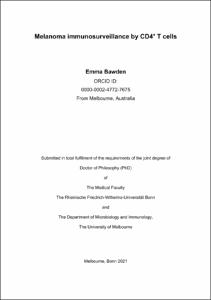Bawden, Emma: Melanoma immunosurveillance by CD4+ T cells. - Bonn, 2021. - Dissertation, Rheinische Friedrich-Wilhelms-Universität Bonn, University of Melbourne.
Online-Ausgabe in bonndoc: https://nbn-resolving.org/urn:nbn:de:hbz:5-62209
Online-Ausgabe in bonndoc: https://nbn-resolving.org/urn:nbn:de:hbz:5-62209
@phdthesis{handle:20.500.11811/9196,
urn: https://nbn-resolving.org/urn:nbn:de:hbz:5-62209,
author = {{Emma Bawden}},
title = {Melanoma immunosurveillance by CD4+ T cells},
school = {{Rheinische Friedrich-Wilhelms-Universität Bonn} and {University of Melbourne}},
year = 2021,
month = jul,
note = {The immune system can recognise and control cancer cells in a process termed cancer immunosurveillance. There is increasing evidence that CD4+ T cells play an important role in melanoma immunosurveillance but considerable debate surrounds the underlying anti-tumoral mechanisms. This project thus sought to unravel the role of CD4+ T cell responses to melanoma using a transplantable orthotopic murine melanoma model in conjunction with newly generated genetically modified B16 melanoma cell lines. Remarkably, adoptive transfer of naïve or activated antigen-specific CD4+ T cells was highly protective against the development of melanoma. In addition to a classical “helper” function, CD4+ T cells acted as peripheral anti-tumoral effector cells whereby they migrated into the skin, differentiated into Th1 cells and mediated local suppression of tumor development. Accordingly, we provide evidence that CD4+ T cells can directly kill melanoma cells in vitro through several cytotoxic pathways, including TNF superfamily signalling via TNF? and FasL as well as perforin-dependent cell lysis. Finally, we investigated the role of MHC-II expression by melanoma on the antitumoral function of CD4+ T cells. Whilst MHC-II expression by melanoma cells promoted CD4+ T cell infiltration into the primary tumor site it was dispensable for control mediated by CD4+ T cells. This suggested an important role for indirect display of MHC-II-restricted epitopes by antigen-presenting cells within the tumor microenvironment. This was supported by visualization of melanoma-specific CD4+ T cells in the tumor microenvironment using two-photon microscopy, where activated CD4+ T cells appeared to interact with melanoma cells via intermediary cells, presumably professional antigen-presenting cells. Finally, we observed a reduction in metastatic lesions in the tumor-draining lymph node in mice challenged with MHC-II deficient melanoma cells. These data suggest that MHC-II may play context-dependent roles in control of primary tumors and lymph node metastases by CD4+ T cells. In summary, this study demonstrates the important role of CD4+ T cells in melanoma immunosurveillance and provides important insights into underlying antitumoral mechanisms.},
url = {https://hdl.handle.net/20.500.11811/9196}
}
urn: https://nbn-resolving.org/urn:nbn:de:hbz:5-62209,
author = {{Emma Bawden}},
title = {Melanoma immunosurveillance by CD4+ T cells},
school = {{Rheinische Friedrich-Wilhelms-Universität Bonn} and {University of Melbourne}},
year = 2021,
month = jul,
note = {The immune system can recognise and control cancer cells in a process termed cancer immunosurveillance. There is increasing evidence that CD4+ T cells play an important role in melanoma immunosurveillance but considerable debate surrounds the underlying anti-tumoral mechanisms. This project thus sought to unravel the role of CD4+ T cell responses to melanoma using a transplantable orthotopic murine melanoma model in conjunction with newly generated genetically modified B16 melanoma cell lines. Remarkably, adoptive transfer of naïve or activated antigen-specific CD4+ T cells was highly protective against the development of melanoma. In addition to a classical “helper” function, CD4+ T cells acted as peripheral anti-tumoral effector cells whereby they migrated into the skin, differentiated into Th1 cells and mediated local suppression of tumor development. Accordingly, we provide evidence that CD4+ T cells can directly kill melanoma cells in vitro through several cytotoxic pathways, including TNF superfamily signalling via TNF? and FasL as well as perforin-dependent cell lysis. Finally, we investigated the role of MHC-II expression by melanoma on the antitumoral function of CD4+ T cells. Whilst MHC-II expression by melanoma cells promoted CD4+ T cell infiltration into the primary tumor site it was dispensable for control mediated by CD4+ T cells. This suggested an important role for indirect display of MHC-II-restricted epitopes by antigen-presenting cells within the tumor microenvironment. This was supported by visualization of melanoma-specific CD4+ T cells in the tumor microenvironment using two-photon microscopy, where activated CD4+ T cells appeared to interact with melanoma cells via intermediary cells, presumably professional antigen-presenting cells. Finally, we observed a reduction in metastatic lesions in the tumor-draining lymph node in mice challenged with MHC-II deficient melanoma cells. These data suggest that MHC-II may play context-dependent roles in control of primary tumors and lymph node metastases by CD4+ T cells. In summary, this study demonstrates the important role of CD4+ T cells in melanoma immunosurveillance and provides important insights into underlying antitumoral mechanisms.},
url = {https://hdl.handle.net/20.500.11811/9196}
}






